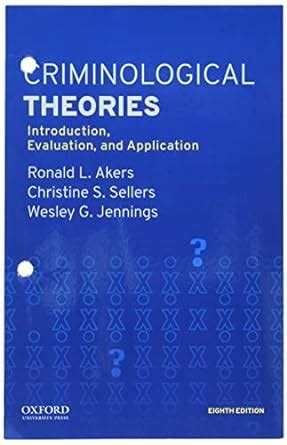Criminological theories are the foundation upon which the study of crime and criminal behavior is built. These theories provide a framework for understanding the causes and consequences of crime, as well as the most effective ways to prevent and control it. In the 8th edition of their book, "Criminological Theories: Introduction, Evaluation, and Application," authors Ronald L. Akers and Christine S. Sellers provide a comprehensive overview of the major criminological theories, evaluating their strengths and weaknesses, and exploring their application in real-world settings.
Why Criminological Theories Matter

Criminological theories are essential for understanding the complex issues surrounding crime and criminal behavior. By examining the various theories, researchers and policymakers can gain insights into the root causes of crime, develop effective prevention and intervention strategies, and create policies that address the underlying factors contributing to crime. Moreover, criminological theories provide a framework for evaluating the effectiveness of crime control measures and identifying areas for improvement.
Theories of Crime Causation
Theories of crime causation attempt to explain why individuals engage in criminal behavior. These theories can be broadly categorized into three main types: biological, psychological, and sociological.
- Biological theories suggest that crime is caused by genetic or physiological factors, such as genetic predisposition or brain chemistry imbalances.
- Psychological theories propose that crime is the result of mental or emotional disorders, such as personality disorders or trauma.
- Sociological theories argue that crime is caused by social and environmental factors, such as poverty, inequality, and social learning.
Evaluating Criminological Theories

Evaluating criminological theories is crucial for determining their validity and usefulness in understanding and addressing crime. Akers and Sellers provide a comprehensive evaluation of the major criminological theories, examining their strengths and weaknesses, and discussing their application in real-world settings.
Theories are evaluated based on several criteria, including:
- Empirical support: Is the theory supported by empirical evidence?
- Parsimony: Is the theory simple and straightforward, or is it overly complex?
- Scope: Does the theory explain a wide range of criminal behaviors, or is it limited to specific types of crime?
- Testability: Can the theory be tested and validated through empirical research?
Applying Criminological Theories
Criminological theories have numerous applications in real-world settings, including:
- Crime prevention: Theories can inform the development of effective crime prevention strategies, such as community-based programs or policy initiatives.
- Intervention: Theories can guide the development of interventions aimed at reducing recidivism or improving treatment outcomes.
- Policy development: Theories can inform the development of policies aimed at addressing the root causes of crime, such as poverty or inequality.
Conclusion
Criminological theories are essential for understanding the complex issues surrounding crime and criminal behavior. By examining the various theories, researchers and policymakers can gain insights into the root causes of crime, develop effective prevention and intervention strategies, and create policies that address the underlying factors contributing to crime. The 8th edition of "Criminological Theories: Introduction, Evaluation, and Application" provides a comprehensive overview of the major criminological theories, evaluating their strengths and weaknesses, and exploring their application in real-world settings.






What are criminological theories?
+Criminological theories are frameworks for understanding the causes and consequences of crime and criminal behavior.
Why are criminological theories important?
+Criminological theories provide a foundation for understanding the complex issues surrounding crime and criminal behavior, and inform the development of effective prevention and intervention strategies.
How are criminological theories evaluated?
+Criminological theories are evaluated based on several criteria, including empirical support, parsimony, scope, and testability.
We hope this article has provided valuable insights into the world of criminological theories. We encourage you to share your thoughts and questions in the comments section below.
